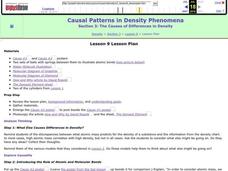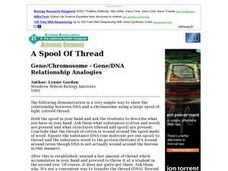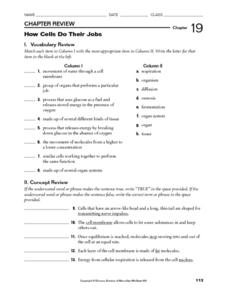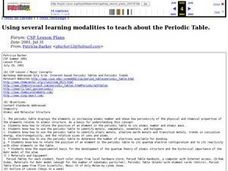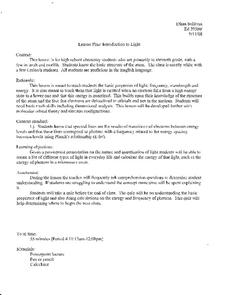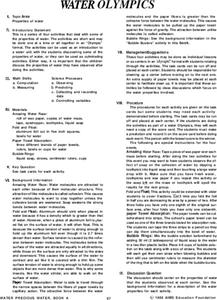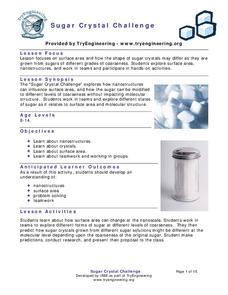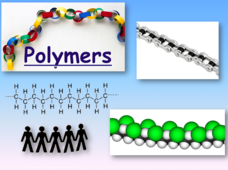Curated OER
Electrophoretic Analysis: DNA Fingerprinting and Evolutionary Divergence
Learners examine the principles of electrophoresis. They evaluate both the agarose and polyacrylamide system of molecular separation. In order to bring the concepts of genetics and evolution full circle from DNA to protein, students...
Curated OER
What's the Big Deal?
Students explore and define methane hydrates and describe ways that it can impact their own lives. In this methane hydrate lesson students create a molecular model and research methane hydrate.
Curated OER
Investigating the Shapes of Covalent Molecules and Measuring their Respective Bond Lengths and Bond Angles
High schoolers will draw Lewis structures of common covalent compounds using a Chem 3D computer program. They will predict the shapes of the molecules, complete a data table, and formulate rules for predicting shapes of molecules. In the...
Curated OER
The Causes of Differences in Density
Students explore what causes differences in density. They observe an models depecting atoms, compounds, and molecules. Students determine if there is air in between atomic bonds. They study the structure and spacing of molecular bonds.
Curated OER
A Spool Of Thread
High schoolers describe a spool of light colored thread that the teacher holds in his/her hands. They are asked what substances (cotton and wood) are present and what structures (thread and spool) are present. The teacher conclude that...
Curated OER
How do things flow in and out of a cell?
Students revise thier partner's essay. They also write the second draft of their essay for homework. Students use the Protein Explorer web site to visualize molecules, ATP, DNA, proteins and lipid bilayer. They are able to see all the...
Curated OER
How Cells Do Their Jobs
In this cells learning exercise, students will review cell characteristics and structure and different types of cells and what role they play in the body. Students will investigate experimental results of the influence of sucrose on the...
Curated OER
Metals vs. Non-Metals
In this elements instructional activity, high schoolers compare and contrast the characteristics of metals and non-metals. Students practice drawing Lewis dot diagrams and writing ion notation. This instructional activity has 9 word...
Curated OER
Doing Lewis Dot Diagrams
Young scholars observe the periodic table and draw the Lewis Dot Diagram. For this investigative lesson students construct information on several elements including the Lewis Dot Formation and take a quiz on the information they...
Curated OER
Matter and Energy
Middle schoolers participate in a small group read aloud of the short story, "Cerium" by Primo Levi. They answer several questions about the story and then relate the reading to a lecture on Kinetic theory. After the lecture they apply...
Curated OER
Pattern And Design in Nature
Students observe natural objects carefully and note intricate design and structure beyond surface form.
Towson University
Mystery of the Crooked Cell
Can your class solve the Mystery of the Crooked Cell? Junior geneticists collaborate to learn about sickle cell anemia in a fascinating lesson plan. The included materials help them to examine the genetic factors behind the disease...
Curated OER
Using several learning modalities to teach about the Periodic Table.
Students identify how to relate the position of an element in the periodic table to its atomic number and atomic mass. They identify how to use the periodic table to identify metals, semimetals, nonmetals, and halogens, and also,...
Curated OER
Forces on the Human Molecule
Learners conduct several simple lab activities to explore the five fundamental load types that can act on structures: tension, compression, shear, bending, and torsion. In this activity, students play the role of molecules in a beam...
Curated OER
Biology: Protein Study
Students in pairs, select and view proteins from the Protein Data Bank. After downloading the tutorial and instructions, they identify the protein's structures and primary biological functions. Then, students present their findings to...
Curated OER
Introduction to Light
Young scholars study the basic structure of the atom. In this chemistry lesson plan, students explain how colors relate to energy that electrons emit. They calculate energy of the emitted photons.
Curated OER
Science Writing for the Masses: a Primer
Students demonstrate a basic understanding of the molecular basis of heredity. They discuss the chemical and structural properties of DNA and explain how genetic information is encoded in genes, replicated, transcribed and translated...
Curated OER
Water Olympics
A fascinating and engaging lesson on the properties of water awaits you. In it, learners engage in four activities that are designed to teach about the properties of water. This exciting plan has worksheets embedded in it which make the...
TryEngineering
Sugar Crystal Challenge
Be sure to use this sweet resource. Scholars perform an experiment using sugar to investigate how surface area relates to the coarseness of sugar. They consider how this concept connects to nanotechnology.
Virginia Department of Education
Macromolecules
Finally, a chance for the class to play with their food! Allow pupils to simulate stomach acid with common foods, and introduce specific macromolecules into the mixture to explore characteristics of carbohydrates, lipids,...
Curated OER
What Are The Properties of Sea Water?
Ninth graders conduct research on the subject of sea water. They use a variety of resources to obtain information. There are helpful resource links listed in the activity. In conjunction with the research students make inquiry of the...
Curated OER
Slime and Intermolecular Attractions
Students explore the strength of intermolecular attractions. They make slime and compare the difference in the physical properties of sheet and powdered polyvinyl alcohol with polyvinyl acetate.
Curated OER
Periodic Table Basics Test
The periodic table of elements is a vital tool for all chemistry apprentices and professionals alike. Here is a chance for your beginning chemists to assess their understanding of the periodic table. They list element names, symbols,...
Science Geek
Polymers
A pirate's favorite amino acid is Arrrrginine! Presentation begins with the difference between a monomer and a polymer. Then it applies that to carbohydrates and proteins and ends with DNA and plastics. Presentation is the last in a...
Other popular searches
- Molecular Structure Lab
- Mineral Molecular Structure
- Building Molecular Structure
- Molecular Structure of Water
- Molecular Shape of Compounds
- Giant Molecular Structure
- Atomic and Molecular Structure
- Lewis Structure Molecular



